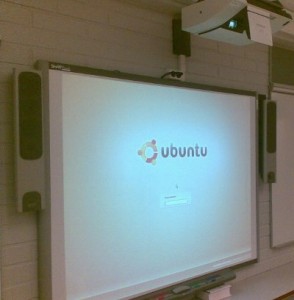Over the years we have been using multiple version control systems and earlier this year we decided to start using Bazaar instead of Subversion because we were planning to start using Launchpad for our development. For various reasons we didn't start using Launchpad after all, but moved to Github, so now came time to migrate away one internal Bazaar repository to Git. I had seen various blog posts about bzr->git migrations, so I thought it'd be easy.
Smartboard Software on LTSP Fat Clients
Ubuntu in Education in Finland
Belinda Lopez asked about Ubuntu adoption in schools and what one would expect from Canonical in this sector:
Smbkrb5pwd - Password Syncing for OpenLDAP, MIT Kerberos and Samba
Here at Opinsys we've been busy trying to figure out how to make user management work easily without having to use ugly tricks to glue different applications together. Changing password sounds really simple to many, but it often gets quite complicated as there are many passwords that need to be changed. It is possible to write a script to change the different passwords at the same time, but that limits password changing to that single script. Using GUI programs through PAM or Moodle to change the password require a different approach.
Itch for Better User Management in Ubuntu
There are a lot of tools for managing users in linux system. A lot of them. And judging by the number of Launchpad blueprints around the topic, there is also a lot of interest to improve Ubuntu's user management infrastructure. Here at Opinsys we've been working with LDAP/kerberos for some years and although the situation has been getting better, there are still a lot of rough edges. It is possible to get complex desktop setups working nicely, but right now the invasion of web applications is reshaping the scene again.
User Management With SSSD on Shared Laptops
A few months ago we had a blog entry about shared and personal laptops in schools. The goal of shared laptops is basically that they should behave mostly like shared thin clients: it should not matter which a computer any user chooses to work with. He should simply be able to pick any machine, login and get his own personal desktop environment, with his own documents and, for example, web browser bookmarks.
How to Use Cucumber With Ruby on Rails and ActiveLdap Resources
I have accustomed to using Cucumber with Ruby on Rails for Behavior Driven Development when using sql database backends. What if data was stored within LDAP? I researched this point and it was very easy.
OpenLDAP Authentication With Kerberos Backend Using SASL
I've been going through quite a few OpenLDAP configuration steps already, but there are still new setup possibilities to try. I'm not sure if I'm always too curious or if it's just the new Ubuntu Lucid that is making me try how these things are working with it.
Setting Up NFSv4+Kerberos+Autofs5-ldap on Ubuntu 10.04 Alpha 2 (Lucid), Part 7
After getting NFSv4 working, it'd be of course nice to automatically mount the nfs exported home directories. In this part I'm going through the steps to get school specific home directories mounted from a central server. Using autofs is an alternative to defining the mounted directories in /etc/fstab. It mounts the directories automatically when they are needed instead of doing it at boot time. This especially handy in situations where some servers are not immediately available after boot because of network issues. Also the number of mounts is kept down when not needed, which has helped with server stability issues. Autofs mountpoints can be configured either statically for every client or centrally in ldap. Ldap configuration allows one to easily add new mountpoints without modifying every client separately.

